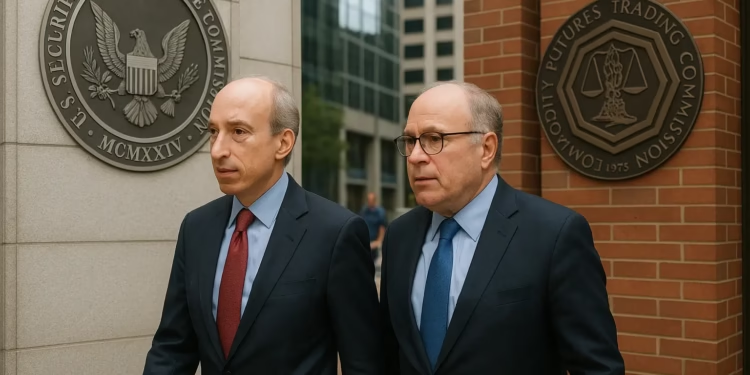SEC Chair Paul Atkins announced plans Wednesday to create an ‘innovation exemption’ that would fast-track approval for tokenized assets and blockchain-based financial products, marking a sharp departure from the enforcement-focused approach of his predecessor Gary Gensler.
Speaking at DC Fintech Week in Washington, Atkins said the regulatory framework aims to attract crypto entrepreneurs back to the US and could be finalized by year-end. The proposal would simplify how crypto firms interact with regulators and reduce compliance barriers that have driven blockchain startups overseas, he said.
The “innovation exemption” and a unified crypto framework
Since taking office in April, Atkins has sought to align crypto innovations with U.S. market competitiveness. In June, he directed SEC staff to draft a proposed “innovation exemption”, a policy aimed at fast-tracking the approval of tokenized assets and blockchain-based financial products.
“The goal,” Atkins explained, “is to simplify how crypto firms interact with regulators and accelerate legitimate experimentation.”
He further outlined his ambition to develop a “super app” linking all federal agencies with jurisdiction over digital assets including the CFTC, the OCC, and the Federal Reserve to eliminate redundant registration requirements.
Industry advocates say this could streamline compliance and reduce the bureaucratic friction that has driven innovation offshore. If the U.S. wants to remain the home of financial technology, it must encourage crypto innovations instead of chasing them away, said Sheila Warren, CEO of the Crypto Council for Innovation, in a statement.
Atkins’ proposed exemption is expected to be finalized before the end of the year, despite ongoing delays from the federal government shutdown that has left the SEC operating under an emergency staffing plan.
A post-Gensler era of policy recalibration
Atkins’ leadership represents a clear departure from the aggressive enforcement record established during Gensler’s tenure. Between 2021 and 2024, the SEC filed 125 crypto-related enforcement actions, imposing over $6 billion in penalties, according to CoinDesk.
Critics argued that the prior administration’s approach relied on outdated interpretations of the 1946 Howey Test, stifling legitimate crypto innovations and pushing blockchain startups overseas.
The change in tone accelerated following the Trump administration’s executive order in January 2025, which called for a regulatory reset to promote digital finance. Acting Chair Mark Uyeda and Atkins subsequently rolled back several enforcement actions, including cases involving Coinbase and Ripple.
The SEC also rescinded Staff Accounting Bulletin 121, which had discouraged banks from offering crypto custody services which is a move widely praised as a victory for crypto innovations and institutional participation.
However, the agency continues to face scrutiny following reports that its IT department under Gensler accidentally deleted a year of text messages related to major enforcement cases, including Terraform Labs. The lapse has sparked congressional inquiries into transparency and record-keeping practices.
Atkins’ vision: balance, protection, and innovation
Despite the challenges, Atkins has sought to position the SEC as a balanced regulator that embraces crypto innovations while maintaining strong investor protections. In a recent speech in Paris, he reiterated the agency’s commitment to safeguarding market integrity.
“If you lie, cheat, or steal from investors, we’ll leave you naked, homeless, and without wheels,” Atkins said, quoting a sign from the office of his first SEC boss, Richard Breeden.
Yet, his message was clear: the era of reflexive enforcement is giving way to one of collaborative innovation. By prioritizing engagement and compliance guidance over punishment, Atkins aims to rebuild trust with both U.S. crypto firms and international partners.
Distributed ledger technology is what excites me most about cryptocurrency, he said. The potential for crypto innovations to make markets faster, safer, and more inclusive is enormous but only if regulators create space for that progress.
Industry leaders have cautiously welcomed this shift. The new SEC tone feels pragmatic and overdue, said Kristin Smith, Executive Director of the Blockchain Association. Atkins understands that fostering crypto innovations doesn’t mean abandoning investor protection as it means updating it for the digital age.
As the SEC redefines its mission, Atkins’ tenure could mark a turning point in how the U.S. regulates digital finance as one that balances accountability with an open door to innovation.











